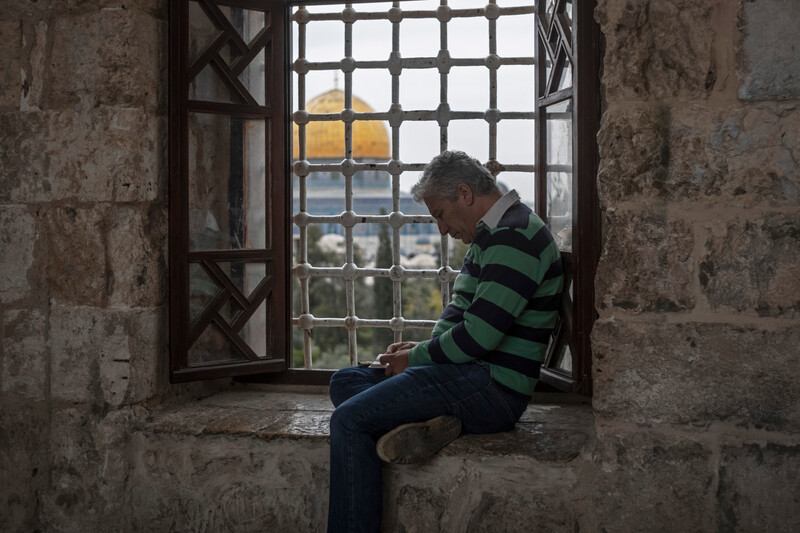The Electronic Intifada 8 August 2024

Israel is imposing harsher restrictions on Muslim access to the Haram al-Sharif.
DPA via ZUMA PressOn 2 August, Israel detained Sheikh Ekrima Sabri, head of the Jerusalem Supreme Muslim Council and the imam of al-Aqsa Mosque.
The ostensible reason for his arrest was a sermon he gave the same day, mourning the murder of Ismail Haniyeh, assassinated in Tehran on 31 July.
Sabri has now been banned from entering the mosque compound, al-Haram al-Sharif, for six months and Israel is threatening to revoke his Jerusalem residency permit.
The cleric is only the most prominent person to have been barred from al-Aqsa – in Islam, the third holiest site in the world – since 7 October. After Israel launched its genocide in Gaza last October, Israeli police have repeatedly thwarted religious freedoms at al-Aqsa mosque, notably during the Muslim holy month of Ramadan.
Meanwhile, led by extremist Israeli ministers like Itamar Ben-Gvir, the public security minister, a growing number of Israeli settlers have been allowed not only to enter the site, but to pray there, in direct contravention of the status quo agreement that is supposed to govern the area and which forbids non-Muslim prayer in the area.
Restricting access
Friday prayers at al-Aqsa are normally attended by tens of thousands of worshippers.
But Israeli restrictions have become gradually tighter over the past several months. One recent Friday – I live right next to the mosque and go there regularly – only a few hundred were able to do so.
Restrictions are often arbitrary. Israeli security forces guard the gates and will stop and question every person trying to enter. Sometimes, they just turn people away for no apparent reason, including Jerusalem residents.
Many worshippers are accustomed to wandering around the different gates of al-Haram al-Sharif in their attempt to enter the site.
On 6 July, Israeli police banned 136 buses of Muslim citizens of Israel from entering al-Haram al-Sharif. They were supposed to participate in an activity for pilgrims to Saudi Arabia. The event was organized by The Al-Aqsa Society for the Care of Islamic Endowments and Holy Sites, which is based in Kafr Bara village inside the Green Line.
In a press release, the association said the police forced the participants outside the Old City. During the eviction, soldiers pushed and assaulted worshippers, according to the association, leaving one child with a fractured arm.
“These unjustified measures reinforce Israel’s racism and disrespect for religious freedom, especially since this is not the first time that Muslims have been prevented from reaching Al-Aqsa Mosque, disregarding all international agreements,” the statement said.
Al-Haram al-Sharif is run by the Jordanian Waqf, the Islamic religious trust, under the so-called status quo agreement. According to Mohammed al-Ashhab, director of public relations and media at the waqf, Israeli authorities continue to handle the mosque issue in a systematically discriminatory way.
There have been a growing number of intrusions by extremist Jews, al-Ashhab told The Electronic Intifada, particularly during religious occasions where the number could reach several hundred. They are often observed to perform rituals such as lying on the ground and blowing trumpets in direct contravention to the status quo agreement.
Israeli “special forces have increased their deployment in the al-Haram al-Sharif premises, especially during Friday prayers,” al-Ashhab added.
Preparing the way
In a recent Friday sermon before he was banned, Sheikh Sabri accused “Israeli occupation forces of imposing semi-emergency measures in the Holy City in order to dominate over the mosque.”
He said Israel is using the ongoing genocide in Gaza to transform the Holy City into a military encampment.
After a Turkish national stabbed and lightly injured an Israeli policeman in one of the Old City’s alleys and was shot dead by security officers, any Turkish national was routinely turned away from the mosque.
South Africans have also felt Israel’s wrath after South Africa lodged its complaint to the International Court of Justice, accusing Israel of committing genocide in Gaza.
Anecdotal evidence suggests South Africans are effectively banned from the compound.
With its current escalatory policies, which infringe on the status quo at the compound, Israel appears to be paving the way for imposing more Jewish access to the site with the aim of enforcing a place for Jewish prayers, similar to the Ibrahimi Mosque in Hebron.
Indeed, Ben Gvir was clear that during his last visit he went there to pray for the release of Israeli captives in Gaza.
Mousa Qous is Executive Director of the African Community Society in Jerusalem.



